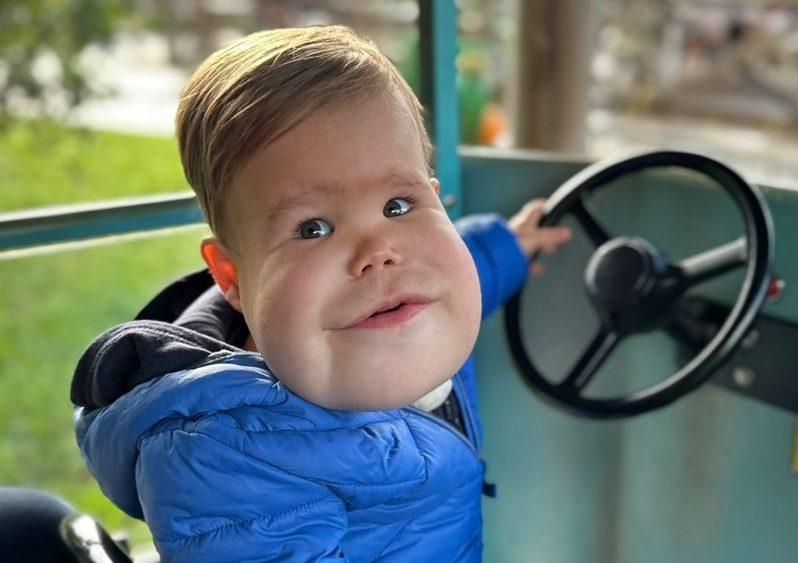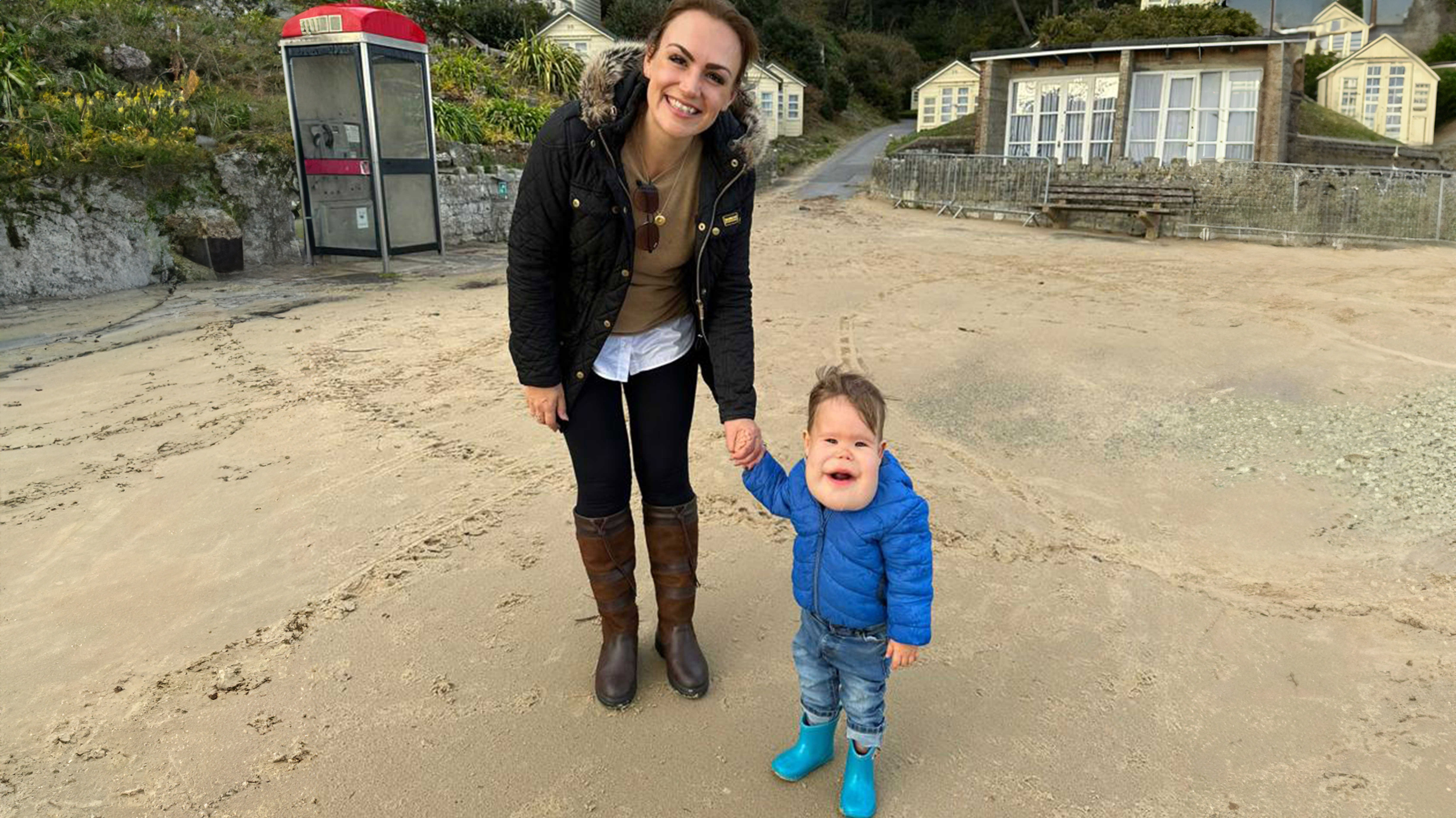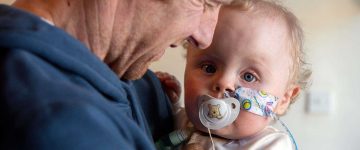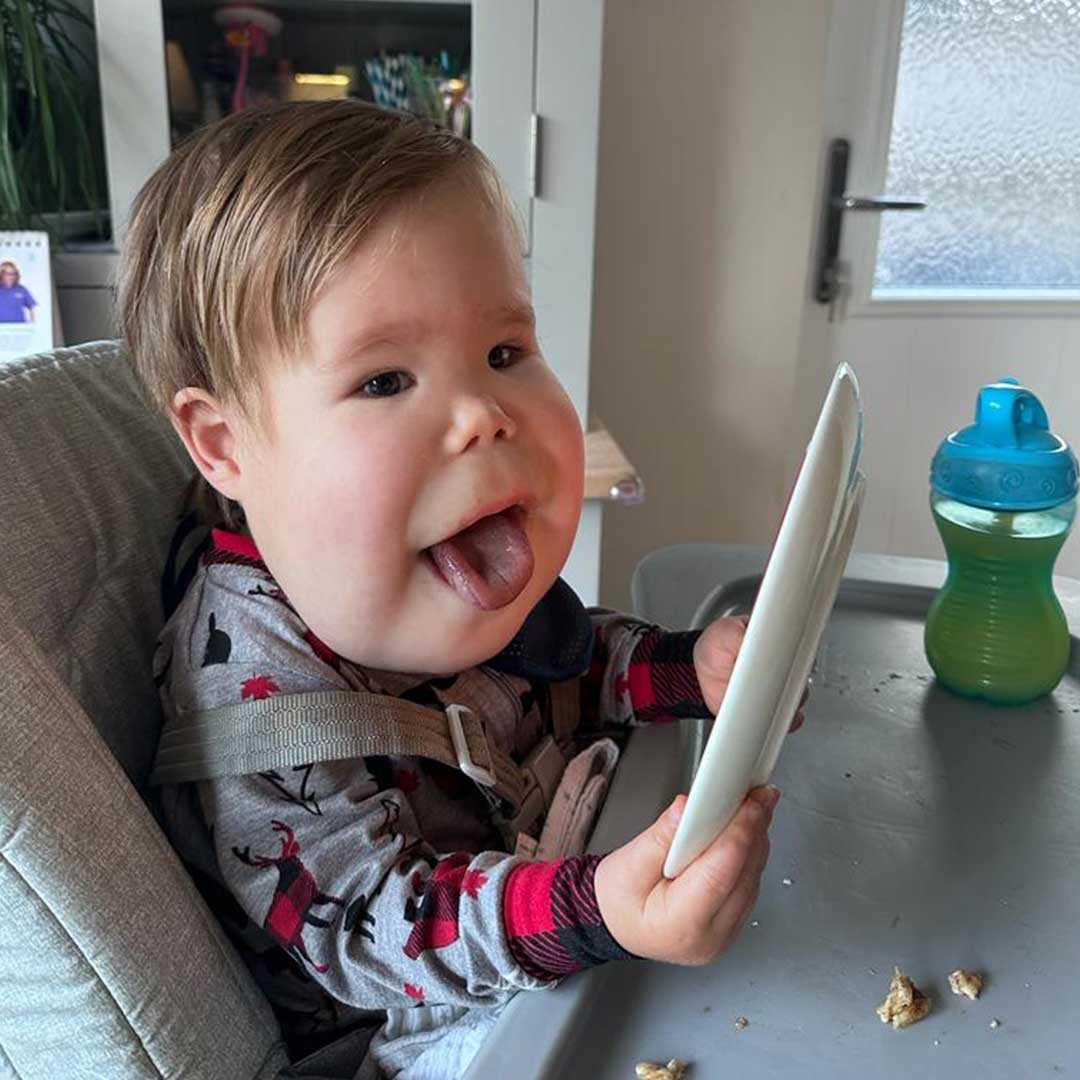Gemma describes her one-year-old son, Finley, as an ‘entertainer who finds the joy in everything’. She says he enjoys going to the park, making faces, playing with his toys and laughing, just like any other almost two-year-old.
When Gemma and her husband Keith attended their 20-week pregnancy scan, the sonographer noticed several black holes under Finley’s chin. After a series of doctors were unsure what the holes could be, Gemma was referred to Southampton Hospital where they were informed Finley may have a tumour or a chromosomal problem.
Finley was born in November 2021 at Southampton hospital and was diagnosed with a condition called lymphangioma. This is a genetic mutation that causes lymphatic vessels to not grow properly, and as a result, lymphatic fluid collects in cavities in the face. Finley spent the first six months of his life in hospital, undergoing multiple surgeries and numerous smaller medical procedures to improve his condition. He was also intubated and ventilated for around a month and then eventually had tracheostomy surgery before coming home.
Gemma explained how there were huge amounts of uncertainty around Finley’s condition and the stress of having a baby in hospital:
‘Doctors were reluctant to give us definite answers because they just didn’t know how it would be. Before Finley arrived, we had mentally prepared ourselves for a maybe a few weeks in the NICU (neonatal intensive care unit), but it ended up being significantly longer than that. We live in Poole, so while Finley was in hospital in Southampton, we stayed in on-site accommodation for three months. There was a lot of back and forth which was a huge strain and very stressful.’
‘I was post-C-section and learning about a new baby, on top of trying to understand Finley’s situation and his medical issues. It was all very overwhelming.’
Although Finley is back at home now and doing very well, Gemma says coping with having a seriously ill child can be ‘a lot to take on’. She describes their lives before Finley as ‘unrecognisable’, and that looking back it feels like ‘a different person.’
‘Your priorities change when you have kids, but when you have a child with additional needs you have so much more to arrange – it can be such a mental load and hugely time consuming. It’s a real minefield, especially if you’ve never done anything like that before.’
Finley was born around the end of the COVID pandemic, so the family were affected by rules around isolation and the risk of passing on potentially fatal infections to their son. If either Gemma or Keith caught COVID, they would not be able to visit Finley in the hospital. Not willing to risk this, Gemma and Keith limited their contact with family and friends.
‘We were forced to limit contact until we knew how robust he would be. We definitely felt isolated. We saw no one for three months. People tried their best to be understanding but there’s only so much they can do – you can’t share the whole load with people in that way.’
‘You always feel a bit different to your friends with healthy kids. But people do make an effort with us to understand Finley's condition and for their kids to get to know him and understand his disability and his differences. I think it’s made people more aware of the diversity of different children and made them more receptive to that, which is a good thing. ‘
Both Gemma and Keith have received counselling for their mental health after Finley was born, and though he is out of hospital, they are still adjusting to their lives as they are now.
‘Our mental health definitely suffered. It’s not over because he’s out of hospital. I’m still in shock – I’m trying to process it all but there’s not really time.’
Despite his condition, Gemma and Keith try their best to normalise Finley’s life as much as possible and not let his disabilities hold them back. Due to his needs, Finley can’t be left with a babysitter, or family members who are not trained in his care. As a result, Gemma, and Keith struggle to get time together, but they take Finley out whenever they can and do all the activities other two-year-olds enjoy.
‘Just because he has a tracheostomy, it doesn’t mean he can’t go to soft play or a kids birthday party or things like that. We always try and integrate him as much as possible.’

The family were introduced to Rainbow Trust when they met a Family Support Worker at Southampton hospital, who was providing support to another family. It was through this that they were able to refer themselves and began receiving support in February 2022.
Rainbow Trust Family Support Worker, Laura, provides emotional support for Gemma, listening to her worries and anxieties, and spends time with Finley in the home to allow Gemma a chance to do some admin or just get herself a cup of tea.
‘If I’m having a bad day, Laura will be the first one to hear about it! It’s just such a nice offering. There’s someone there for you to talk to, who’s willing to help and is just really adaptable. Laura understands what it’s like and she is always so keen to help.’
‘Laura is just such a nice person. She goes out of her way to bring sensory toys that will help Finley in his development, and she’s started learning some sign-along so she can communicate with Finley. She is so invested in the relationship, which is really nice.’
Although Finley does not have siblings, Gemma has seen first-hand the importance of the sibling support offered by Rainbow Trust:
‘I think it’s so brilliant. I just can’t imagine the logistical nightmare of having other children to look after whilst looking after a child with a disability. Being able to take all the kids to Paulton’s Park on a family day with the help of a Family Support Worker makes all the difference. It’s just such a brilliant offering. There’s nothing else like it.’
Family Support Worker Laura has also provided practical help to support Gemma when Keith went back to work by taking her and Finley to his appointments.
‘Finley has a lot of appointments to attend, and I physically can’t do it alone. Taking Finley and all his equipment is impossible, so Laura’s practical help and support was invaluable. My husband and I spent so much time together in hospital, and then suddenly, he had to go back to work, but Finley was still having all of these appointments. It was really invaluable at that time.’
The family have also benefitted from attending days out, organised by Rainbow Trust, with other families with a seriously ill child.
‘Although everyone’s story is different, families with a seriously ill child all live in a parallel universe to people with healthy children. It was just so nice looking around and seeing other children carrying suction machines, or trachy boxes, or other medical equipment, because when you’re in hospital that’s all normal but when you come out you realise how abnormal it all is. So, meeting other people with similar scenarios is really reassuring.’
Gemma admitted that at first, the idea of accepting help from somebody outside of your friends and family can feel unusual, but she encourages other families with a seriously ill child to reach out and accept the help they deserve:
‘It took me a while to come around, I felt guilty – like, do we deserve this? But I would say, find all the help you can get, accept it, and utilise it. You will probably need it. Don’t feel guilty or ashamed, or embarrassed.’
Please donate to Rainbow Trust today so we can support more families like Finley’s.


